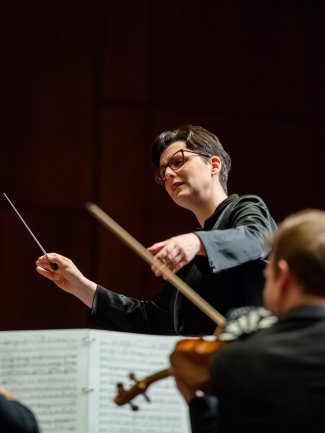
A Conversation With … Geneviève Leclair
1/5/2024
A Conversation with … is a Dance blog series
What sparked your love for dance, and how old were you when you started?
I was two and a half years old when I started taking ballet and five when I started music lessons. I can’t say I remember what sparked my love for either, but my parents tell me I’m the one who chose to do it. Dance and music coexisted in my life for as long as I can remember. Around the age of 14, I started conducting and it was love at first-sight! It soon became clear to me that this is what I wanted to do. I continued dancing until I was 19, at which point I was in college and music required all my focus. But my love of dance never went away and, years later, coming back to it from the pit seemed like the most natural thing.
What productions/projects have been a particular career highlight for you?
Two come to mind:
Back in 2018, I conducted a performance of Nureyev’s The Sleeping Beauty at The National Ballet of Canada. They were celebrating the 80th anniversary of Nureyev and the 50th of that particular production. Many original cast members were in attendance. That was a really special moment.
The other one was in 2017, also at The National Ballet of Canada, when I got to conduct John Neumeier’s ballet Nijinksy. I am a big fan of Mr. Neumeier’s work. That particular choreography is nothing short of a masterpiece. And despite the fact that I don’t really have ‘favourite pieces of music’, Shostakovich Symphony No.11 is not very far from it. It’s a piece that I love and that never fails to move me. Put the two together, and it makes for a very special artistic experience!
Who is your favourite choreographer and why?
In the same way that I don’t really have favourite pieces or composers, I don’t really have favourite choreographers. I’ve never really been the groupie kind. I don’t render blanket judgements on people’s work; I tend to take things one moment at a time.
I think that’s a good thing in a conductor. Every time I step on the podium, my job is to give the audience the best performance possible and to give that piece of music (and/or choreography) its best shot. In order to do that, I have to generate that kind of enthusiasm in myself. If I don’t believe it, my performance will convince neither the orchestra, the dancers, nor anyone else. So, at any given moment, my favourite choreographer or composer is the one I am working with.
How do you unwind and relax after a long day of rehearsals or performances?
After three, six, and sometimes nine hours of standing (mostly) still, the most important thing is to put my feet up! The next thing is a good, healthy meal. Busy rehearsal and performance periods can run up to 6 days per week and you get off stage late, so it’s important to eat well-balanced meals so your sleep is not compromised. I also like to keep up my exercise routine. My body is my instrument, so it has to stay in shape.
If you could dance alongside any celebrity or famous dancer, who would it be and why?
There are too many great artists out there I would like to work with to pick only one!
What are your hobbies/passions outside dance?
I like cooking, particularly baking… I make mean French macarons! These days, I don’t play flute and recorder as much as I used to, but I do keep it up, just for myself. I also like cross-stitching, reading, watching movies and TV series.
Why did you decide to follow a career conducting ballet orchestras?
As I mentioned above, I danced ballet for 17 years, so conducting ballet orchestras was a natural fit. It allowed me to fulfil two passions. This being said, I also conduct symphony and opera. I love music and performance in all its forms. But ballet always holds a very special place in my heart. I feel at home in the ballet pit.
What is the difference between conducting a ballet vs an opera or symphonic orchestra?
When you conduct, whether it’s symphony, ballet or opera, you need a thorough understanding of everything involved in the performance. In symphony and opera, you draw on your musical acumen. In ballet as well, but you also need a thorough understanding of dance. Therefore, in order to be a good ballet conductor, you need to train in a second medium so you can “read” movement as fluently as you read music. That training is not part of the standard training of conductors, which tends to focus on symphony and opera, so you have to seek it out. In my case, the years of dancing came in handy, but even then, looking at dance from the “outside- in” rather than from the “inside-out” requires some adjustment.
Because of its very nature, ballet conducting requires the capacity for real-time in-performance adjustments on a greater scale than opera and symphony. I think all conductors should conduct ballet at some point in their career; it’s a real technique-honing art!
Ballet also requires conductors who can check their ego at the door. Normally, the conductor in ballet is not the artistic director. It’s a truly collaborative musical endeavour and you need to be capable of working inside a team and adapting (which is not the same as compromising!) your musical vision to mesh with the performance as a whole. It’s incredibly stimulating, from an artistic standpoint.
What is your favourite ballet to conduct?
Whichever one I am working on right now!